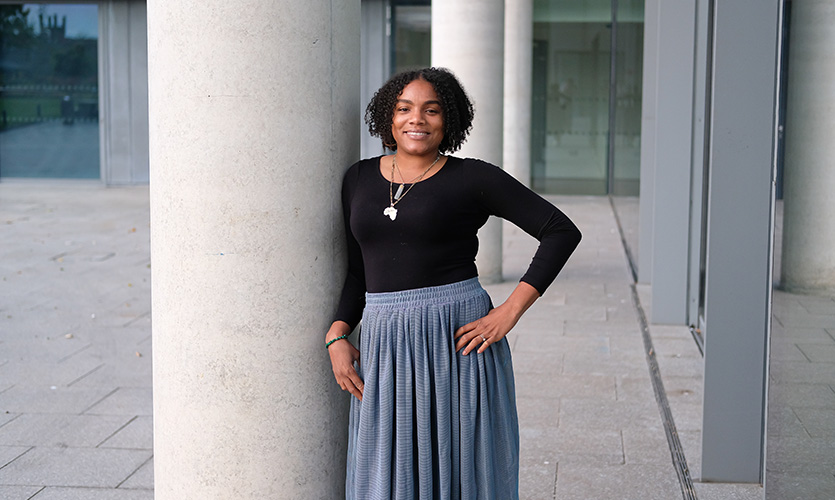Chantelle Lunt

Chantelle is an advocate of racial equality, having experienced racism throughout her life, particularly during her service as a Police Officer. Using her own experiences, as well as her knowledge gained through study for her MA in Criminology and Social Policy here at LJMU, Chantelle works with local and national organisations to decolonise community, work and education spaces, promoting racial literacy and expanding knowledge of Black history.
She is the founder of Merseyside Alliance for Racial Equality CIC (MARE), a non-profit organisation committed to promoting racial equality across Merseyside through grassroots community-led education and engagement work.
Chantelle has just started her PhD with us and is also a Graduate Trainee Tutor with our School of Education.
She also presents TV shows and podcasts and writes about the contemporary civil rights movement and UK policing for national grassroots campaigns and independent media platforms.
Chantelle features in our ‘Humans of LJMU’ series in collaboration with the ‘Humans of Liverpool’ social media account, sharing the stories of the people who make our city, communities and university the vibrant, inclusive place it is in celebration of our bicentenary year.
“With my insider perspective as someone who’s been in their position, coupled with my criminology knowledge from studying at LJMU I decided to set something up. So, I founded the BLM alliance, which has become an influential organisation within Merseyside. Then I became a national campaigner, chairing panels at the International Anti-Racism conference in London and helping to found the Kill the Bill campaign. So, the past two years have been a bit of a blur.”
– Chantelle Lunt

Chantelle’s ‘Humans of LJMU’ interview
“Before I was an activist, I was a police officer. I made a complaint that was logged initially as a hate crime, but when it was investigated internally, nothing happened and so I had a real insider’s view of the racism and sexism within the force. This was prior to the widely publicised cases of Sarah Everard and George Floyd, so those issues hadn’t yet been highlighted to the public. I was shocked at the response when I began to challenge it - I became a target. That was not what I thought the police force would or should look like. After resolving with myself what happened, I was offered a permanent post with the police and offered my degree but I didn’t want to be a part of it.
“I left and funded my own studies and it was in the middle of my degree that George Floyd was murdered. I was watching not just Derek Chavin, but the officers of colour who were standing with their backs to it and I thought that’s exactly what can happen. When you’re in the force, every officer has a choice; they can be quiet about it, make a fuss or leave. But some officers just choose to ignore it and when you start to ignore the little things, that’s where it can lead.
“With my insider perspective as someone who’s been in their position, coupled with my criminology knowledge from studying at LJMU I decided to set something up. So, I founded the BLM alliance, which has become an influential organisation within Merseyside. Then I became a national campaigner, chairing panels at the International Anti-Racism conference in London and helping to found the Kill the Bill campaign. So, the past two years have been a bit of a blur.
“We then set up Merseyside Alliance Racial Equality. BLM was reactive, on the street to fight against what is happening with a megaphone, but we understand that eradicating what is happening requires work at a community level. Through MARE we deliver training, working with schools and getting out and engaging organisations to understand and take action. So, we no longer have black lives taken by the police and the institutional racism that is embedded in many societal institutions. Hopefully, we won’t need to be activists in ten years' time.”
